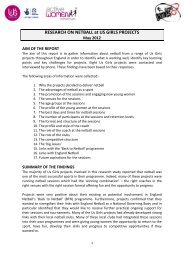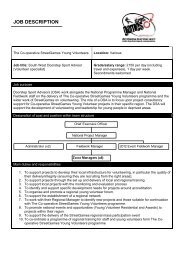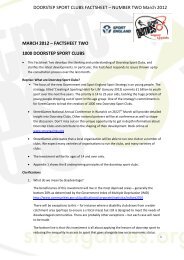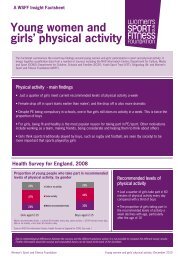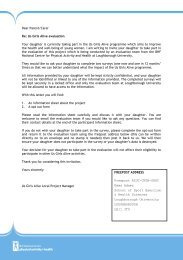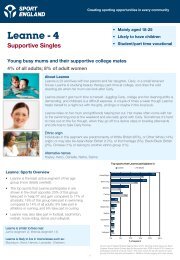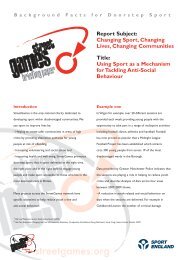Framework for Building a Participation Legacy - StreetGames
Framework for Building a Participation Legacy - StreetGames
Framework for Building a Participation Legacy - StreetGames
Create successful ePaper yourself
Turn your PDF publications into a flip-book with our unique Google optimized e-Paper software.
<strong>Framework</strong> <strong>for</strong> <strong>Building</strong> a <strong>Participation</strong> <strong>Legacy</strong><br />
3<br />
What is a <strong>Participation</strong> <strong>Legacy</strong>?<br />
The London2012 legacy action plan included the<br />
promise “Make the UK a world-leading sporting<br />
nation”. Community sport broadly and <strong>StreetGames</strong><br />
specifically were designated as crucial to fulfilling<br />
legacy ambitions of inspiring young people through<br />
sport and getting people more active.<br />
The participation legacy, there<strong>for</strong>e, focused on<br />
enhancing and increasing opportunities <strong>for</strong> engaging<br />
in quality sport from grassroots to elite levels.<br />
Increasing participation has been shown to be<br />
challenging and there was little increase in<br />
participation figures in England in the two decades<br />
prior to London 2012. The British government was<br />
aware from the beginning that a participation legacy<br />
would not occur without specific, focused ef<strong>for</strong>ts.<br />
‘‘There is nothing inevitable or Godgiven<br />
about the legacy of the 2012<br />
Games”.<br />
(Tessa Jowell, <strong>for</strong>mer Culture, Media<br />
and Sport Secretary and Olympic<br />
Minister)<br />
Increases in participation require substantial resource<br />
and planning as well as an ability to tackle the<br />
complex combination of factors that shape individual<br />
decisions to initiate and sustain participation in sport.<br />
How can a mega event help increase participation?<br />
Examples of linking to mega-event<br />
activities<br />
Mega-events do not automatically influence mass<br />
participation; however, the publicity, excitement,<br />
attention to sport, festival-like qualities, and inspiration that they can generate have been used<br />
to develop and enhance sports delivery (Weed, Coren,& Fiore, 2009). Conceptually, the links<br />
between mega sports events and participation include:<br />
<br />
<br />
<br />
<br />
<br />
Joining with national initiatives<br />
Joining with local partners such as<br />
schools, colleges, charities, and<br />
local authorities to host events<br />
Link provision to festival activities<br />
giving a young people a chance to<br />
try the sport and meet people<br />
(local, club, university, elite) who<br />
play it regularly<br />
Mega-sports related tournament<br />
Sports-related activities such as<br />
‘back to netball’<br />
Develop taster programmes that<br />
include a series of free sessions in<br />
local indoor/outdoor venues that<br />
are free with no advance booking<br />
<br />
<br />
<br />
Taster sessions of mega-sport<br />
events to existing groups<br />
Fitness activities linked to broader<br />
values of activity associated with<br />
the mega-event<br />
Combinations of local and regional<br />
activities to increase interactions<br />
between communities<br />
<br />
<br />
<br />
Mega sports events may inspire already active participants to increase participation or<br />
to try new activities. This trickle-down approach does not work <strong>for</strong> everyone and needs<br />
to be supported through community initiatives.<br />
The festival-like atmosphere of mega sports events may encourage active and less active<br />
members of the population to get involved in local activities linked to this festive spirit.<br />
The appearance of new sports on the sporting landscape may create an interest in trying<br />
these activities.<br />
March 2013





